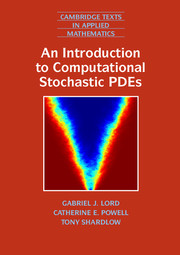Book contents
8 - Stochastic Ordinary Differential Equations
Published online by Cambridge University Press: 05 July 2014
Summary
A stochastic ordinary differential equation (SODE) is an ordinary differential equation with a random forcing, usually given by a white noise ζ (t). White noise is chosen so that the random forces ζ (t) are uncorrelated at distinct times t. For example, adding noise to the ODE du/dt = -λu, we consider the SODE
for parameters λ, σ > 0 and an initial condition u0 ∈ ℝ. As we saw in §6.3, ζ (t) = dW (t)/dt for a Brownian motion W(t) and we rewrite (8.1) in terms of W(t) by integrating over [0, t]. Consider
which is written in short as
The solution is a stochastic process {u(t): t > 0} such that (8.2) holds for t ≥ 0 and is known as the Ornstein–Uhlenbeck process.
More generally, we introduce a vector-valued function f: ℝd → ℝd, known as the drift, and a matrix-valued function G: ℝd → ℝd × m>, known as the diffusion, and consider SODEs of the form
also written for brevity as
where u0 ∈ ℝd is the initial condition and W (t) = [W1(t),…, Wm (t)]T for iid Brownian motions Wi(t). The last term in (8.3) is a stochastic integral and it needs careful definition.
- Type
- Chapter
- Information
- An Introduction to Computational Stochastic PDEs , pp. 314 - 371Publisher: Cambridge University PressPrint publication year: 2014
- 1
- Cited by

